Following a year of continued disruption from disaster events that were exacerbated by the COVID-19 pandemic, the 22nd Resilient Australia Awards celebrated local commitment to building resilience.
A record number of projects were submitted to the 2021 Resilient Australia Awards program, with 48 national finalists selected from 182 submissions across 7 categories: business, community, government, local government, schools, photography and mental health and wellbeing.
In her address to the National Awards Ceremony on 8 December 2021, Former Australian Institute for Disaster Resilience Executive Director, Amanda Leck, said the volume and breadth of the submissions captured the spirit of shared responsibility and collaborating for whole-of-community solutions.
‘This year’s record number of submissions is a reflection of our creative and adaptive response to a period that has tested our resilience in more ways than one.
‘Building authentic, lasting resilience in our communities has never been more important. To achieve this, we need a whole-of-community approach and to work together. These awards celebrate steps towards this goal and acknowledge the work of the finalists, who are all helping to support a disaster resilient Australia', she said.
Former Minister for Emergency Management and National Recovery and Resilience, Senator the Hon Bridget McKenzie, attended the event and presented the awards. Senator McKenzie commended the efforts of the national award finalists who have ‘taken us on great strides to build more resilience’.
Senator McKenzie said, ‘Nobody likes to think that disasters will befall them, their community or their family, but unfortunately we know that we can expect more extreme weather events, and we’re seeing compounding disaster events.
‘We all share a vision of an Australia where communities not only recover more swiftly from disasters but are much better prepared before these events even occur. We all have a responsibility in this space. We can’t just leave it to others… we’re all in this together', she said.
National Award: educational, economic and community-led resilience building
Prevention through fire-safety education is the first line of defence against misuse of fire, and fire-related injuries and fatalities. While fire-safety education is implemented by fire services organisations around the world to prevent, respond to and recover from fire, there are no overarching evidence-based guidelines for the development or evaluation of programs.
To address this, Fire and Rescue NSW (FRNSW) conducted a comprehensive study. The results informed the revision of their approach to fire-safety education. The project was the winner of the Resilient Australia National Award.
Acting Inspector and Command Liaison Officer of FRNSW Community Engagement Unit, Anthony Picone, said, ‘We believe that to build resilience in the next generation, we must enhance their education and preparedness in this generation.
‘By giving our current school children the knowledge, the skills and the resilience to move forward and know what to do in an emergency and to educate their families in the same, will build resilience in the future', he said.
Through the delivery of evidence-based fire-safety education programs and the sharing of knowledge, FRNSW has provided effective and usable information for children and their families.
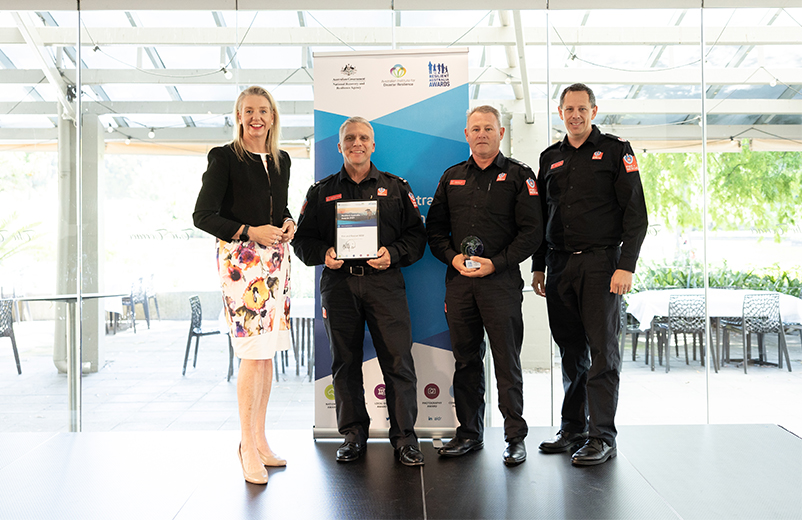
Anthony Picone, Michael Jay and Trent Curtain, Fire and Rescue NSW, accept the Resilient Australia National Award from Senator McKenzie.
Image: Australian Institute for Disaster Resilience
Many businesses in regional and rural Australia were affected by the 2019–20 bushfires and the COVID-19 pandemic. In January 2020, the Spend With Us marketplace was created to assist bushfire-affected small businesses without technical knowledge to continue to trade and get their products freely online. Founded by Sarah Britz, Lauren Hateley and Jenn Donovan, Spend With Us opened a new channel for these businesses, becoming Australia's first and largest online marketplace dedicated to rural and regional small and microbusinesses.
The Spend With Us marketplace was a highly commended project in the Resilient Australia National Award category. There are now over 1,000 registered Spend With Us sellers on the website, with more than 7,000 products listed and 320,000 members in the Buy From a Bush Business Facebook group community.
The platform provides a central place for consumers to find and buy unique products from people in rural and regional Australia and allows communities to diversify their income.
When the community of Happy Valley on K’gari (Fraser Island, Queensland) was assessed as ‘undefendable’ in 2018, residents were triggered to act. The Happy Valley Community Bushfire Risk Management project was a community-driven planning and development process to ensure the community, with input from local and Queensland Government agencies, was in the best possible position to defend itself. The project built on community knowledge, skills and networks to deliver the Operational Incident Action Plan and the Hazard Reduction and Fire Management Plan. Hazard mitigation and reduction planning and delivery, supported by community engagement and education, were critical components of the project.
The success of the project was evident when, on 7 December 2020, the K’gari bushfire threatened the Happy Valley township reserve. There was no loss of life or property due to the prior preparation and planning of locals.
Suncorp Resilient Australia National Community Award: youth agency and legal aid in recovery, diversity in disaster resilience
Suncorp sponsored the Resilient Australia National Community Award and Executive General Manager, Corporate and Regulatory Affairs, Karyn Munsie, said she was inspired by the innovation and ingenuity of the submissions.
‘As a leading insurer, we do see the impacts, year after year, of natural disasters and all of our research tells us that even small-scale events can have a very large consequences; financially, emotionally and physically’, she said.
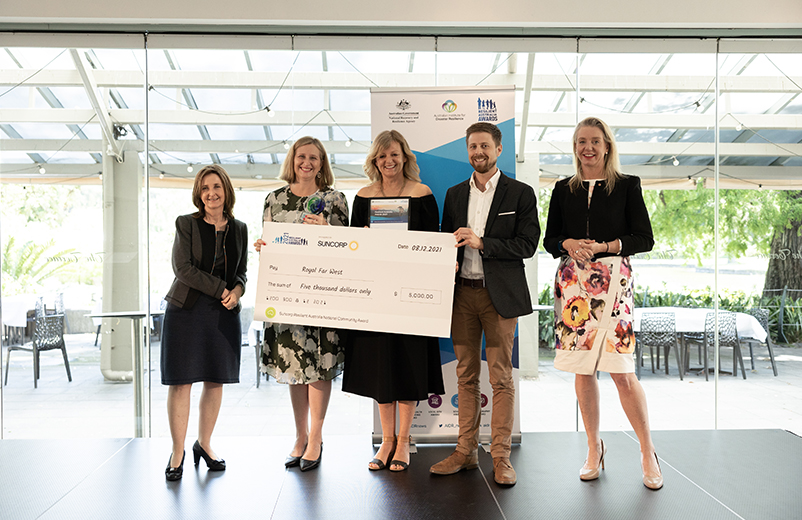
Suncorp Executive General Manager, Corporate Regulatory Affairs, Karyn Munsie awards Jacqueline Emery, Sarah Eagland and Chris Anderson of Royal Far West with $5000 for winning the Suncorp Resilient Australia National Community Award.
Image: Australian Institute for Disaster Resilience
Royal Far West won the Suncorp Resilient Australia National Community Award for their Bushfire Recovery Program, built on the belief that children should have their voices heard and be supported in the recovery process. Following consultation with affected communities and experts in recovery, Royal Far West designed a program to support the wellbeing and resilience of children to reduce the likelihood of long-term adverse effects. The Bushfire Recovery Program, delivered by multi-disciplinary health clinicians, was rolled out in over 30 communities, supporting more than 3,000 children through group programs, individual therapy and capacity building. Recognising the value of helping those around the child, the program also supported more than 1,700 parents, educators and local professionals.
Royal Far West Occupational Therapist Tayla Iellamo said, ‘Following the bushfires, we wanted to help give children a voice because they also have a story to tell following disasters and they need to be included and supported in the recovery process’.
Youth resilience building was also the focus of the highly commended Journey of Hope project by Save the Children that supports children to build resilience and develop ways to cope with worry and anxiety. The evidence-based program helps children and caregivers cope with trauma, identify triggers and stressors, develop their natural resilience and coping strategies and strengthen their support networks through group sessions. Trained facilitators delivered the program through schools and early education centres in regional Victoria and New South Wales in areas affected by the 2019–20 bushfires. Journey of Hope was also delivered in Melbourne to support children struggling with the pandemic; reaching 5,043 children in 80 schools.
Community Legal Centres South Australia's Bushfire Community Legal project in Kangaroo Island was also highly commended in the Suncorp National Community Award category for rethinking and recalibrating how the community legal sector delivers holistic legal outreach in rural areas. The project delivers community-led regular, free, accessible and trauma-informed face-to-face legal help to people in remote areas of South Australia. It contributes to community resilience by providing legal advice to identify, de-escalate and resolve legal issues arising from or exacerbated by disaster. The project worked with the Kangaroo Island community to address general and disaster-specific information gaps through community legal education; giving the community confidence and tools to take responsibility for their wellbeing.
A third of Australia’s population is born overseas and one in five people speak a language other than English at home.1 Multiculturalism is part of the Australian identity, but culturally and linguistically diverse (CALD) communities face challenges and barriers that increase their vulnerability. On the other hand, these communities also possess a wealth of experiences and abilities with a strong potential to enrich emergency management knowledge and practices.
Australian Red Cross was highly commended for their project, Disaster Resilience in CALD Communities. The 2-year project focused on volunteer mobilisation, community engagement, capacity building, development of multilingual preparedness resources, advocacy and research, with the aim of supporting CALD communities to enhance their disaster resilience.
National School Award: a lesson in student wellbeing
In 2020, Pimlico State High School adopted remote learning due to pandemic restrictions. The school used the opportunity for innovation in teaching and learning and explored opportunities to maintain student connection through extracurricular opportunities.
The school’s Beyond COVID-19 project was the winner of the Resilient Australia National School Award. Pimlico State High School Executive Principal, Joel Buchholz said the school used learnings from the 2019 Townsville floods to foreground its response to the pandemic.
‘We had some really clear lessons from the previous year when Townsville experienced a major flood event and we saw from that the importance of wellbeing. We took some lessons from that time into the way we structured the work we did around student wellbeing and support in the pandemic', he said.
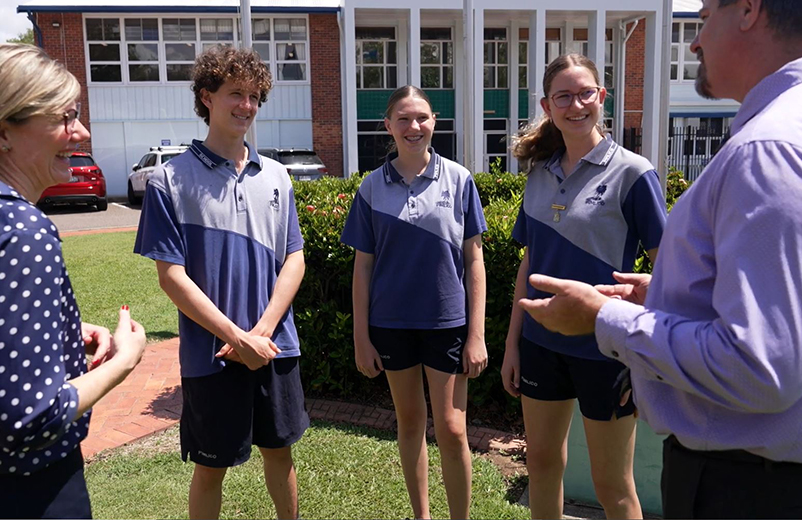
Pimlico State High School won the Resilient Australia National School Award for their Beyond COVID-19 program to enhance student wellbeing during remote learning.
Image: Polygraph Productions
The school partnered with charities to distribute computers to students to ensure disadvantaged families had access to online learning. Wellbeing programs were revised for online learning and wellbeing was at the forefront of the response.
Student wellbeing was also central to the highly commended Central West Health and Wellbeing Day project from Longreach State High School. This project aimed to strengthen the bonds between communities and break the stigma associated with mental health. High school students from the surrounding towns were invited to the event, with over 220 students and teachers attending. The Health and Wellbeing Day promoted uncommon conversations leading to personal insights and change and provided students with a platform to learn, grow and discover themselves while experiencing different wellbeing exercises.
Another highly commended National School Award was the Resilience Project from St John’s School that promoted gratitude, empathy, mindfulness and emotional literacy for their students. The initiative has evolved and, in 2021, the focus was mental health, starting with the theme ‘it’s okay to have a blue day’ then shifting to resilience and having ways to bounce back. Activities targeted mental health, physical health, connection and kindness, because their research found that these elements can improve mental health and resilience in times of adversity.
National Local Government Award: working together to prepare and recover, taking a person-centred approach
A state-wide effort to enhance emergency management planning across all 68 South Australian councils was awarded the Resilient Australian National Local Government Award.
The Local Government Association of South Australia developed the Council Ready program to support councils to produce tailored emergency management plans to reduce the effects of high-risk hazards in their communities. This program provided guidance on local government emergency management planning and implemented this through a capacity-building approach. The program design was informed by extensive early engagement with councils and emergency sector stakeholders, which created a foundation and buy-in. A team of project facilitators was critical to the success of Council Ready. They ‘walked beside’ councils to support the capacity building and cultural change required to embed emergency management in practices.
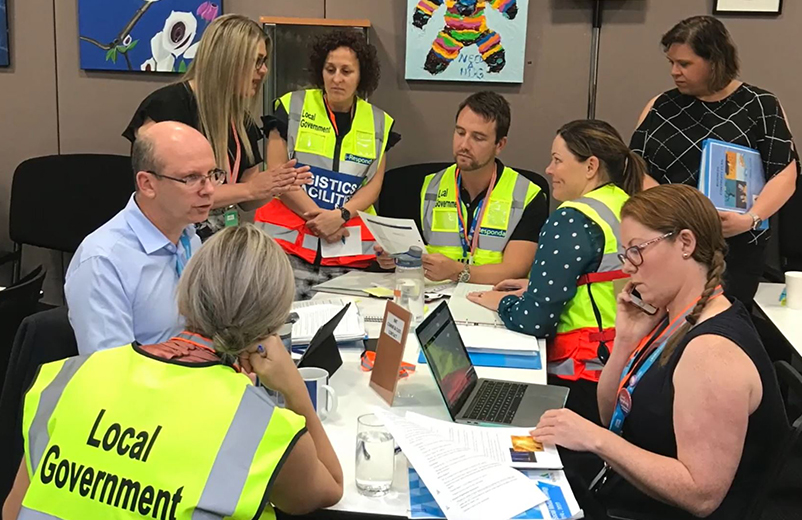
The Local Government Association of South Australia was the winner of the Resilient Australia National Local Government Award for their project, Council Ready.
Image: Local Government Association of South Australia
Australian Red Cross National Manager of Emergency Services, Andrew Coghlan, congratulated the project team for ‘yet another fantastic example of what local governments are doing, considering their local community’s individual needs and the unique environments in which they reside.’
The Bega Valley Shire was found to be the most disaster-affected local government area during 20202 due to the NSW bushfires, subsequent flooding and the pandemic that created broad-reaching challenges for the region.
The Bega Valley Shire Council was highly commended for their efforts to face these immense challenges. The council partnered with the NSW Government to pilot a regional recovery plan, to set up the Bega Valley Local Bushfire Recovery Committee and establish the Recovery Resilience and Rebuilding program to deliver bushfire recovery programs. Throughout the chaos and recovery, Bega Valley Shire Council stayed true to values that people matter, and that recovery is a journey of walking with the community.
Another highly commended project was Person-Centred Emergency Preparedness (P-CEP) to improve the safety and wellbeing of people with disability in the Mackay region. Led by Mackay Regional Council, the project took a capacity-development approach to connect emergency managers with people with disability and their carers, the community, health and aged care providers and disability service providers to learn about and use a P-CEP toolkit. Participants used the P-CEP to develop emergency plans tailored to their individual support needs.
National Mental Health and Wellbeing Award: 2 winners in inaugural award
In 2021, the Mental Health and Wellbeing Award was added as a new category to the Resilient Australia Awards program.
Former Minister for Emergency Management and National Recovery and Resilience Senator McKenzie said, ‘It’s heartening to see for the first time in 22 years of the history of these awards that the importance of mental health and wellbeing is being recognised.
‘I do think that the compounding impact and effect of flood season, bushfires, cyclonic events overlayed by Covid, means that mental health and wellbeing of our volunteers, our workforce and our communities is very much at the forefront so it’s great to see this recognised in the awards today’, she said.
A collaborative effort between University of Melbourne, Massey University, Australian Red Cross and the Bushfire and Natural Hazards CRC produced the Recovery Capitals (ReCap) resources that was a winner of this category. The ReCap project supports mental health and wellbeing after disasters by providing resources for those undertaking recovery activities. Research from past disasters can guide good decision-making and recovery actions, but findings are often not readily accessible to people supporting recovery.3
University of Melbourne’s Prof Lisa Gibbs said, ‘The point of ReCap is to bring evidence forward so people can make decisions about disaster recovery with confidence about what’s known and about what makes a difference’.
ReCap supports inclusive, holistic, strengths-based approaches and takes a broad view of the influences on mental health and wellbeing after disasters. It emphasises the interconnectedness between natural, social, financial, cultural, political, built and human capital.
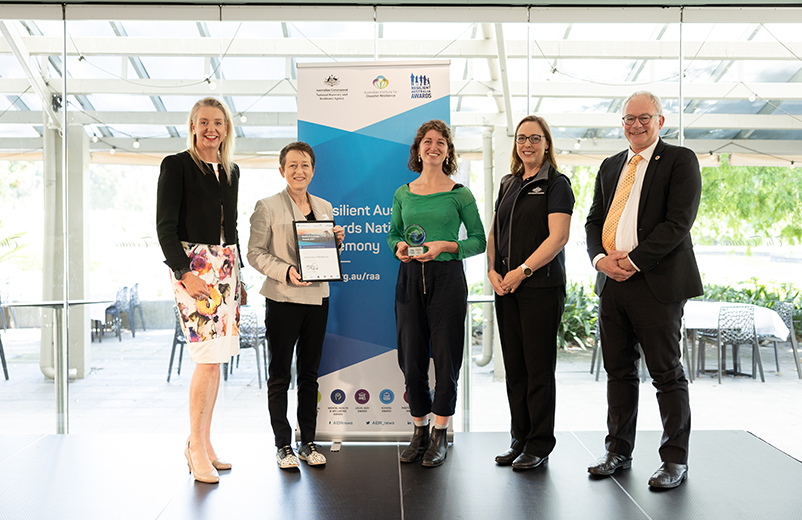
Lisa Gibbs, Phoebe Quinn, Bronwyn Sparkes and John Richardson are presented with the Resilient Australi National Mental Health and Wellbeing Award by Senator McKenzie.
Image: Australian Institute for Disaster Resilience
Another winner of the National Mental Health and Wellbeing Award was Beyond Blue for the Be You Bushfire Response program that provided mental health support to early learning services and schools affected by the 2019–20 bushfires. The program recognised the role that learning communities can play in promoting positive mental health and strengthening resilience. Led by Beyond Blue with delivery partners Early Childhood Australia, headspace and Emerging Minds, the program assisted over 430 learning communities.
Beyond Blue Chief Community Officer, Patrice O’Brien, said, ‘We quickly realised that schools and early learning services were going to play this really important role. And it wasn’t only with the children and young people, but it was actually the role of schools and early learning services ended up playing as becoming a community hub in recovery from a disaster'.
Taking a place-based approach, the Be You program offered specialist trauma support and guidance, recovery planning and service mapping to address the mental health issues raised by the bushfires, the COVID-19 pandemic, floods and drought.
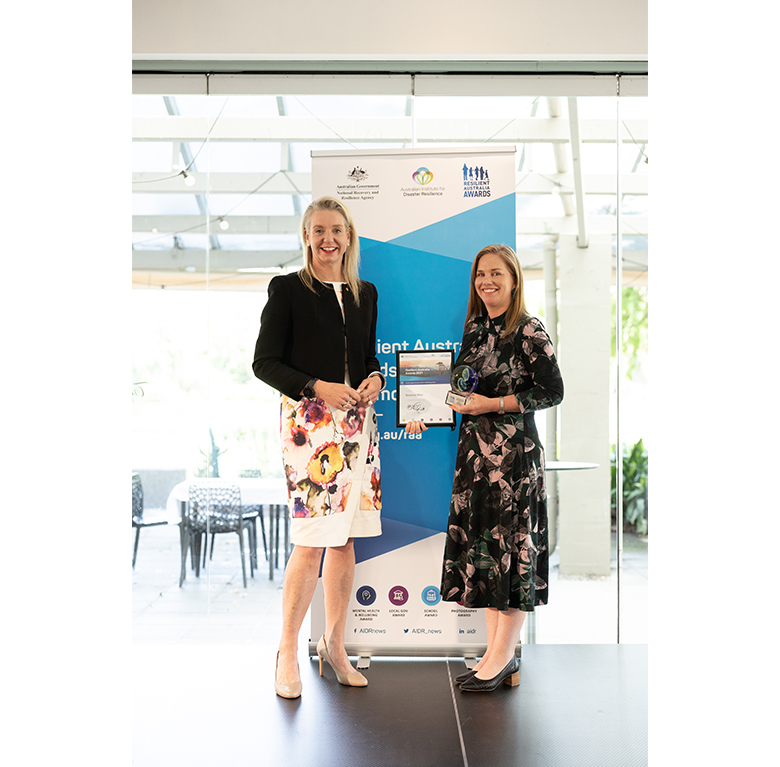
Beyond Blue Chief Community Officer Patrice O'Brien accepts a Resilient Australia National Mental Health and Wellbeing Award from Senator McKenzie.
Image: Australian Institute for Disaster Resilience
Across Australia, thousands of young adults volunteer their time as firefighters and emergency services personnel to help communities. Inherent in this role, however, is repeated exposure to potentially traumatic events. A study by the University of Adelaide resulted in the development of a Wellbeing Framework and Resource Guide for mental health in young adult fire and emergency volunteers. It was highly commended at the National Award Ceremony. The study was on addressing and preventing mental health symptoms and disorders among young adult fire and emergency services volunteers aged 16–25. The resources developed were co-designed with fire and emergency personnel and young volunteers, ensuring they are relevant to those who will be using them.
National Photography Award: capturing volunteer and community spirit
Over 50 photographs were submitted to the 2021 Resilient Australia Awards. Finalists were selected via a people’s-choice vote conducted through the Australian Institute for Disaster Resilience Facebook page, which returned more than 3,700 votes. The winning image features on the cover of this edition of the Australian Journal of Emergency Management.
The image was captured during the 2019–20 bushfire season along the Oaks fire trail in the Blue Mountains region of NSW. Virginia Eastman’s photograph, ‘Still Standing – We and the Trees’, depicts a lone firefighter against a charred landscape. Virginia joined the Blaxland Fire Brigade in 2013 and her first major event as a volunteer was the 2019–20 bushfires. She described her subject, donned in personal protective equipment, as ‘glowing like a golden yellow beacon of hope in defiant contrast to the black and grey expanse of desolation’.
Virginia said, ‘When the comfort and “colour” of normality feels like it has burnt to black in the wake of destructive forces, resilience is finding a bright flash of something “golden” within yourself, others or your environment, to be a powerful contrast to the darkness that can come with challenging times’.
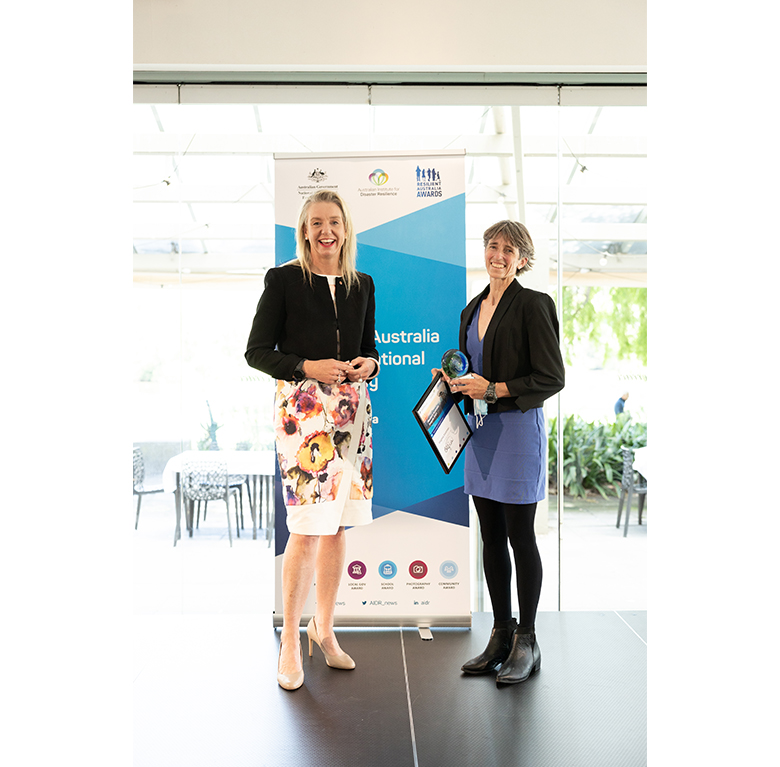
Blaxland Rural Fire Service volunteer, Virginia Eastman accepts the Resilient Australia National Photography Award from Senator McKenzie.
Image: Australian Institute for Disaster Resilience
Adam Meyer was highly commended for his portrait, ‘The Resilience of Soxy’, and shared his subject’s story of personal experience that has influenced and contributed to the resilience of his Yorke Peninsula community.
‘The bushfires came to Soxy's community in 2019, destroying houses, burning crops, killing stock and threatening whole towns. The first shearing shed Soxy worked in was reduced to ash while Soxy was fighting the fire.
‘Soxy, being a resilient man, helped set up the local Blazeaid, was a founding member of the local recovery committee and gave physical and verbal support to the affected farmers and residents. He was the fixer. So many would say he was the difference between recovery and despair’, he said.
Jacqueline Quaine was highly commended for her photograph of Victorian State Emergency Services volunteers training in the rain at night. One volunteer with 20 years’ experience shared his knowledge with a fellow volunteer with 6 years’ experience.
Jacqueline said, ‘The resilience of the unit depends on a diversity of skills and experience, on new members joining and more experienced members staying on and sharing their skills. In developing their individual resilience and demonstrating the resilience of the unit, they contribute to the resilience of the community they serve, and the service they represent’.
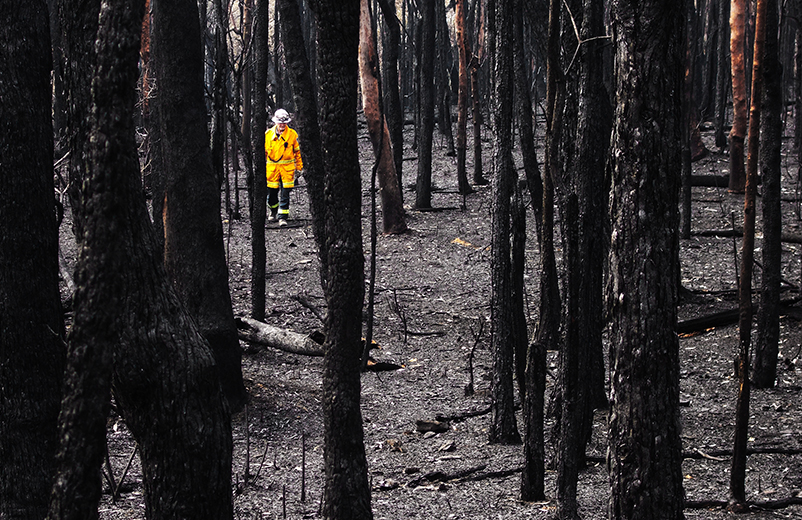
Winner of the Resilient Australian National Photography Award: Still Standing – We and the Trees.
Image: Virgina Eastman
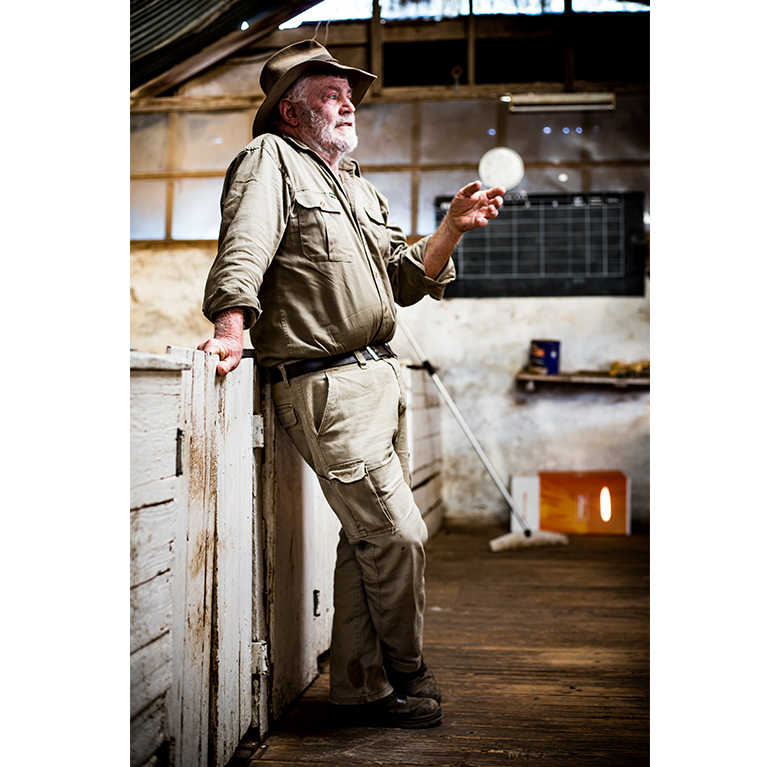
Highly commended in the Resilient Australian National Photography Award: The Resilience of Soxy
Image: Adam Meyer
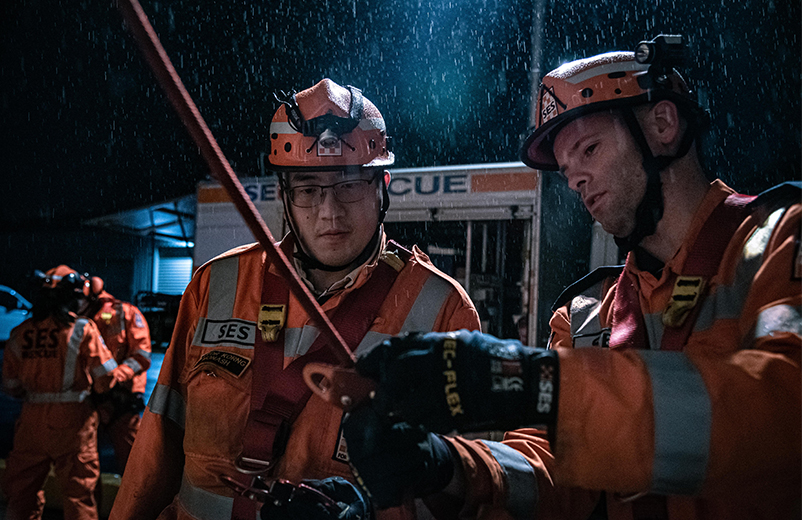
Highly commended in the Resilient Australian National Photography Award: Just another Monday Night
Image: Jacqueline Quaine


